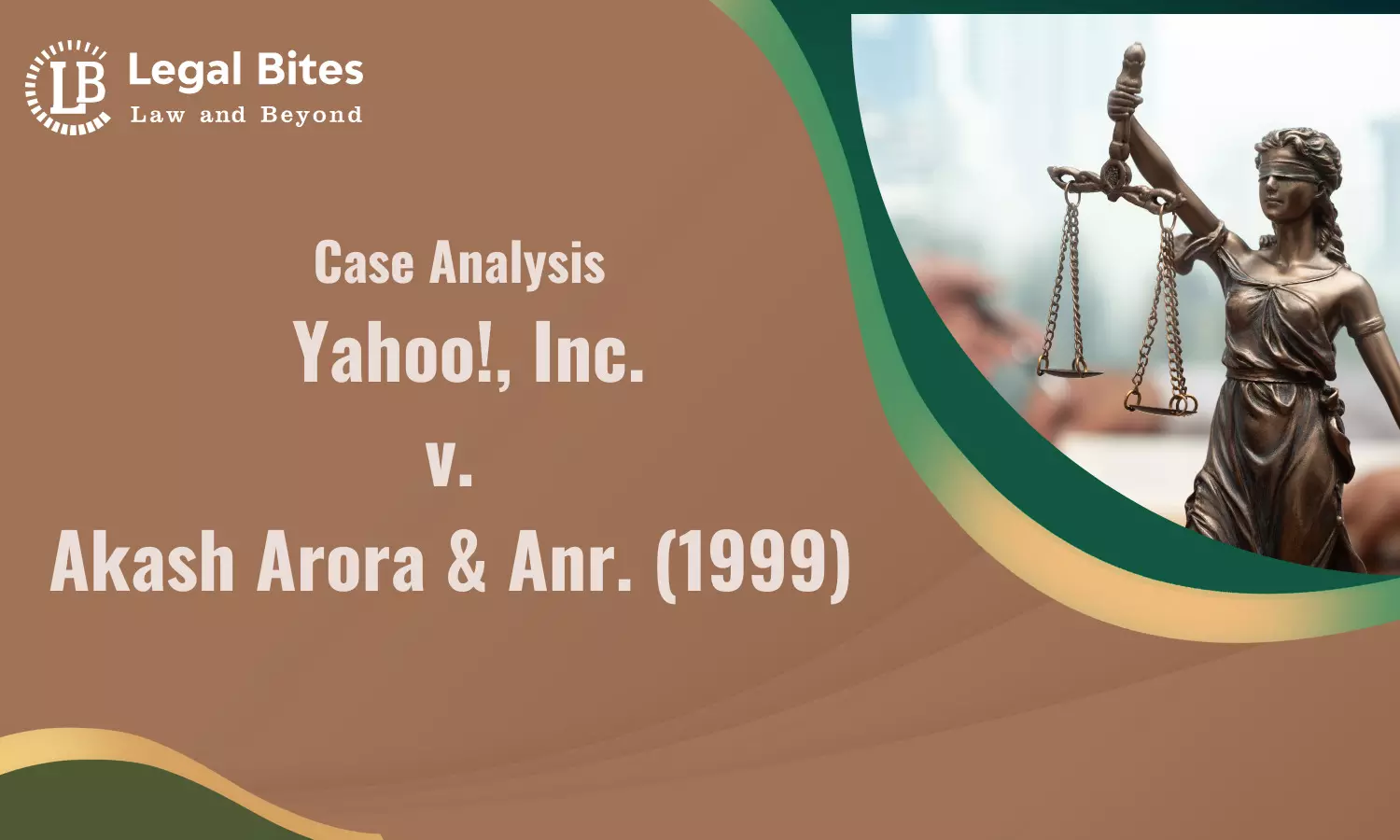Case Analysis: Yahoo!, Inc. v. Akash Arora & Anr. (1999) | Passing off under Indian Trademark Law
The Case Analysis “Yahoo!, Inc. v. Akash Arora & Anr. (1999)” contains a significant decision of the Delhi High Court in relation to the protection of trademarks

The Case Analysis 'Yahoo!, Inc. v. Akash Arora & Anr. (1999)' contains a significant decision of the Delhi High Court in relation to the protection of trademarks and designs in a dispute of cybersquatting.
Case Title: Yahoo!, Inc v. Akash Arora & Anr.
Court: Delhi High Court
Citation: 78 (1999) DLT 285
Bench: Justice M. K. Sharma
Date of Judgment: 19th February 1999
Introduction
The Delhi High Court in India heard the case of Yahoo Inc. v. Akash Arora & Anr, which involved brand infringement. Akash Arora and Anr. were charged with duplicating major chunks of Yahoo! Inc.'s website, including its layout, design, and content. Yahoo! Inc. is a multinational technology business.
Yahoo Inc. argued that to trick drug dealers and draw traffic to their website, Akash Arora and Anr. had purposefully imitated their website. They claimed that there had been a blatant infringement of the brand and asked for compensation.
The case established that website owners had the same rights as other brand owners to protect their intellectual property from infringement and highlighted significant problems with brand infringement on the internet. This instance also emphasises the importance of taking precautions against website copying, such as employing encryption and other security measures.
Facts
- Multinational corporation Inc. claimed that by building a website that was primarily similar to Yahoo!, defendants Akash Arora and Anr. had violated their brand.
- They maintained that the defendants had purposefully imitated their website to trick drug users and drive traffic to their own devices.
- The defendants' website was similar to Yahoo!'s in terms of design, content, and layout. The defendants had used items, similar brand names, and other private materials without permission.
- Also argued that by utilising their brand name, and other personal materials, the defendants had seriously harmed their reputation and goodwill.
- Yahoo! contended that, in terms of Indian brand law, the defendant's actions constituted an obvious case of brand infringement. Conversely, the defendants contended that they had just utilised Yahoo!'s website as a reference and had not intentionally replicated it.
- They argued that the similarities between their website and Yahoo!'s website were not substantial enough to be considered a breach of brand identity, nor that their website was primarily similar to Yahoo!'s website.
- Additionally, the defendants said that they had not exploited Yahoo!'s trademark, symbol, or other private content in a way that would confuse drug users.
Laws Involved
Passing off under Sections 27(2), 29 and 106 of the Trade and Merchandise Marks Act, 1958
Issues
The major questions in the case included whether Yahoo! was entitled to a remedy under Indian trademark law and whether the defendants had violated Yahoo!'s brand by making a website that was primarily similar to Yahoo!'s.
Plaintiff's Arguments
- In the event of a trademark infringement, the plaintiff's domain name and trademark were safeguarded.
- The defendants replicated the plaintiff's format, contents, layout, and colour scheme, adopting the same brand, Yahoo India.
Defendant's Arguments
- The plaintiff is not just pursuing infringement of the registered mark because their trademark/domain name, Yahoo!, was not registered in India.
- "Yahoo!" is a common dictionary word that doesn't have a particular meaning.
- The accused made use of a disclaimer.
Judgment
According to the court's ruling, if a brand name is close to the name of another business, consumers may become confused and employ that brand name, which could cause harm to the plaintiffs.
The defendants are prohibited from conducting any business, selling, advertising, or dealing in services or goods on the internet or under the trademark/domain name "Yahooindia.com" or any other trademark/domain name that is similar to the plaintiff's trademark until the suit is resolved, according to an ad interim injunction granted by the court in favour of the plaintiff against the defendants.
The court determined that the respondent was guilty of violating the "Yahoo" trademark and placed him under administrative suspension because he was engaging in cybersquatting by using confusingly similar not only services but also the name of the domain similar to Yahoo. This ruling was made because, in the instance of Yahoo INC. in particular, a company's reputation is largely derived from its name and trademark.
Therefore, it was decided that the defendant's use of the domain name "yahooindia.com" should be permanently discontinued because the word "Yahoo" had gained its reputation.” Yahoo Inc. was permitted to use the passing-off remedy.
Conclusion
In this instance, domain name protection on the Internet is the subject of discussion. Given that the defendant's name is the same as the plaintiff's domain name, Yahoo!, there is no question that this might lead to consumer misunderstanding and deception. Because they had to pass the uniqueness criteria, domain names were not registered as trademarks before this ruling. When it came to trademark registration, domain names were a murky legal matter. A website name must pass a test to be eligible for trademark registration, meaning it must be strong enough to serve as both a trademark and a name for the products and services offered by the company. As a result, the court has the authority to stop companies using confusingly identical marks from operating.

